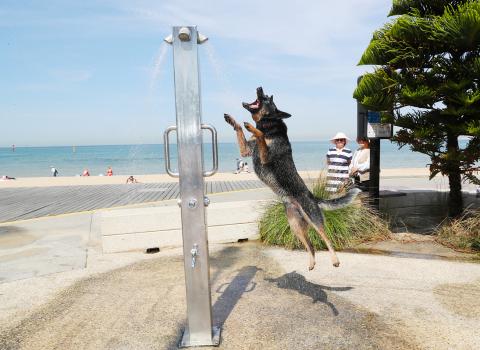Australia this week experienced its hottest day on record and the heat wave is expected to worsen, exacerbating an already unprecedented bushfire season, authorities said yesterday.
The average nationwide temperature of 40.9°C on Tuesday beat the previous record of 40.3°C in January 2013, the Australian Bureau of Meteorology said.
“This heat will only intensify further today [Wednesday],” meteorologist Diana Eadie said.

Photo: EPA-EFE
The heat wave is another alarm bell about global warming in Australia, where this year’s early and intense start to regular summer bushfires has heaped pressure on the Australian government to do more to tackle climate change.
Hundreds of bushfires have been raging across Australia for months, including a “mega-blaze” burning north of Sydney.
Smoke from the fires has engulfed Sydney, raising air pollution to hazardous levels in an event that leading doctors have labeled a “public health emergency.”
At least 3 million hectares of land has been torched across Australia, with six people killed and about 700 homes destroyed.
Scientists have said that the blazes have come earlier and with more intensity than usual due to global warming, and a prolonged drought that has left the land dry and many towns running out of water.
The fires have sparked climate protests targeting the conservative government, which has resisted pressure to address the root causes of global warming to protect the country’s lucrative coal export industry.
Record spot temperatures were recorded this week in western Australia, where firefighters have also been battling blazes raging across thousands of hectares of land.
The hot weather is drifting across the country’s arid center toward the east.
Temperatures in parts of New South Wales are forecast to reach about 45°C today, while those in western Sydney are due to reach more than 46°C as conditions worsen on Saturday.
Turbulent winds of up to 100kph are forecast to also hit the eastern coast and worsen the blazes.
“Over the next few days, we are going to see firefighters, the emergency services and all those communities close to fires ... challenged with a new threat,” New South Wales Rural Fire Service Commissioner Shane Fitzsimmons said yesterday.
Embers carried by the winds can travel up to 30km from a blaze, authorities said.
“We are going to have a number of fronts that are going to fuel or escalate the fires burning, but also the potential to have spot fires and embers traveling very long distances,” New South Wales Premier Gladys Berejiklian said.
Australian Prime Minister Scott Morrison last week made a rare admission that climate change was one of the “factors” behind the fires, but he defended the government’s record on emissions reduction and failed to announce additional measures to address the issue.
Climate protesters plan to march on Morrison’s official residence in Sydney this week to rally for change and highlight his absence as large parts of the country burn. Morrison is vacationing at an undisclosed location overseas.

Yemen’s separatist leader has vowed to keep working for an independent state in the country’s south, in his first social media post since he disappeared earlier this month after his group briefly seized swathes of territory. Aidarous al-Zubaidi’s United Arab Emirates (UAE)-backed Southern Transitional Council (STC) forces last month captured two Yemeni provinces in an offensive that was rolled back by Saudi strikes and Riyadh’s allied forces on the ground. Al-Zubaidi then disappeared after he failed to board a flight to Riyadh for talks earlier this month, with Saudi Arabia accusing him of fleeing to Abu Dhabi, while supporters insisted he was

‘SHOCK TACTIC’: The dismissal of Yang mirrors past cases such as Jang Song-thaek, Kim’s uncle, who was executed after being accused of plotting to overthrow his nephew North Korean leader Kim Jong-un has fired his vice premier, compared him to a goat and railed against “incompetent” officials, state media reported yesterday, in a rare and very public broadside against apparatchiks at the opening of a critical factory. Vice Premier Yang Sung-ho was sacked “on the spot,” the state-run Korean Central News Agency said, in a speech in which Kim attacked “irresponsible, rude and incompetent leading officials.” “Please, comrade vice premier, resign by yourself when you can do it on your own before it is too late,” Kim reportedly said. “He is ineligible for an important duty. Put simply, it was

The Chinese Embassy in Manila yesterday said it has filed a diplomatic protest against a Philippine Coast Guard spokesman over a social media post that included cartoonish images of Chinese President Xi Jinping (習近平). Philippine Coast Guard spokesman Jay Tarriela and an embassy official had been trading barbs since last week over issues concerning the disputed South China Sea. The crucial waterway, which Beijing claims historic rights to despite an international ruling that its assertion has no legal basis, has been the site of repeated clashes between Chinese and Philippine vessels. Tarriela’s Facebook post on Wednesday included a photo of him giving a

Syrian President Ahmed al-Sharaa on Sunday announced a deal with the chief of Kurdish-led forces that includes a ceasefire, after government troops advanced across Kurdish-held areas of the country’s north and east. Syrian Kurdish leader Mazloum Abdi said he had agreed to the deal to avoid a broader war. He made the decision after deadly clashes in the Syrian city of Raqa on Sunday between Kurdish-led forces and local fighters loyal to Damascus, and fighting this month between the Kurds and government forces. The agreement would also see the Kurdish administration and forces integrate into the state after months of stalled negotiations on